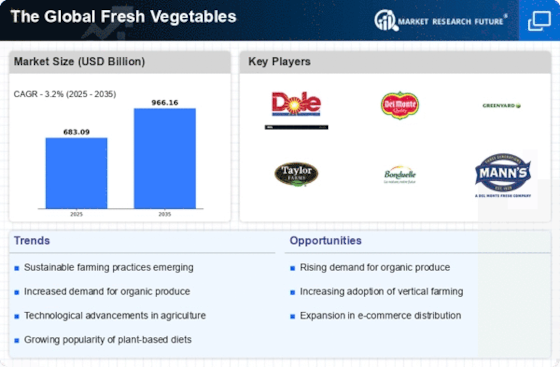-
EXECUTIVE SUMMARY
-
Market Overview
-
Key Findings
-
Market Segmentation
-
Competitive Landscape
-
Challenges and Opportunities
-
Future Outlook
-
MARKET INTRODUCTION
-
Definition
-
Scope of the study
-
Research Objective
-
Assumption
-
Limitations
-
RESEARCH METHODOLOGY
-
Overview
-
Data Mining
-
Secondary Research
-
Primary Research
-
Primary Interviews and Information
-
Gathering Process
-
Breakdown of Primary Respondents
-
Forecasting Model
-
Market Size Estimation
-
Bottom-Up Approach
-
Top-Down Approach
-
Data Triangulation
-
Validation
-
MARKET DYNAMICS
-
Overview
-
Drivers
-
Restraints
-
Opportunities
-
MARKET FACTOR ANALYSIS
-
Value
-
chain Analysis
-
Porter's
-
Five Forces Analysis
-
Bargaining Power of Suppliers
-
Bargaining Power of Buyers
-
Threat of New Entrants
-
Threat of Substitutes
-
Intensity of Rivalry
-
COVID-19 Impact Analysis
-
Market Impact Analysis
-
Regional Impact
-
Opportunity and Threat Analysis
-
Fresh Vegetables Market,
-
BY Type (USD Billion)
-
Leafy Greens
-
Root Vegetables
-
Fruiting Vegetables
-
Cruciferous Vegetables
-
Legumes
-
Fresh Vegetables Market,
-
BY Distribution Channel (USD Billion)
-
Supermarkets
-
Online Retail
-
Farmers Markets
-
Specialty Stores
-
Fresh Vegetables Market,
-
BY Organic Certification (USD Billion)
-
Organic
-
Conventional
-
Fresh Vegetables Market,
-
BY Packaging Type (USD Billion)
-
Loose
-
Bags
-
Containers
-
Pre-packaged
-
Fresh Vegetables Market,
-
BY Regional (USD Billion)
-
North America
-
US
-
Canada
-
Europe
-
Germany
-
UK
-
France
-
Russia
-
Italy
-
Spain
-
Rest of Europe
-
APAC
-
China
-
India
-
Japan
-
South Korea
-
Malaysia
-
Thailand
-
Indonesia
-
Rest of APAC
-
South America
-
Brazil
-
Mexico
-
Argentina
-
Rest of South America
-
MEA
-
GCC Countries
-
South Africa
-
Rest of MEA
-
Competitive Landscape
-
Overview
-
Competitive Analysis
-
Market share Analysis
-
Major Growth Strategy in the
-
Fresh Vegetables Market
-
Competitive Benchmarking
-
Leading Players in Terms of Number of Developments
-
in the Fresh Vegetables Market
-
Key developments and growth strategies
-
New Product Launch/Service
-
Deployment
-
Merger
-
& Acquisitions
-
Joint Ventures
-
Major Players Financial Matrix
-
Sales and Operating Income
-
Major Players R&D Expenditure.
-
Company Profiles
-
Hormel Foods
-
Financial Overview
-
Products Offered
-
Key Developments
-
SWOT Analysis
-
Key Strategies
-
Kraft Heinz
-
Financial Overview
-
Products Offered
-
Key Developments
-
SWOT Analysis
-
Key Strategies
-
Calavo Growers
-
Financial Overview
-
Products Offered
-
Key Developments
-
SWOT Analysis
-
Key Strategies
-
Bakkavor Group
-
Financial Overview
-
Products Offered
-
Key Developments
-
SWOT Analysis
-
Key Strategies
-
Dole Food Company
-
Financial Overview
-
Products Offered
-
Key Developments
-
SWOT Analysis
-
Key Strategies
-
Cargill
-
Financial Overview
-
Products Offered
-
Key Developments
-
SWOT Analysis
-
Key Strategies
-
Green Giant
-
Financial Overview
-
Products Offered
-
Key Developments
-
SWOT Analysis
-
Key Strategies
-
Nestle
-
Financial Overview
-
Products Offered
-
Key Developments
-
SWOT Analysis
-
Key Strategies
-
Bonduelle
-
Financial Overview
-
Products Offered
-
Key Developments
-
SWOT Analysis
-
Key Strategies
-
Fresh Del Monte Produce
-
Financial Overview
-
Products Offered
-
Key Developments
-
SWOT Analysis
-
Key Strategies
-
Ardo
-
Financial Overview
-
Products Offered
-
Key Developments
-
SWOT Analysis
-
Key Strategies
-
Chiquita Brands International
-
Financial Overview
-
Products Offered
-
Key Developments
-
SWOT Analysis
-
Key Strategies
-
Lassonde Industries
-
Financial Overview
-
Products Offered
-
Key Developments
-
SWOT Analysis
-
Key Strategies
-
Taylor Farms
-
Financial Overview
-
Products Offered
-
Key Developments
-
SWOT Analysis
-
Key Strategies
-
Del Monte Foods
-
Financial Overview
-
Products Offered
-
Key Developments
-
SWOT Analysis
-
Key Strategies
-
Appendix
-
References
-
Related Reports
-
LIST
-
Of tables
-
LIST OF ASSUMPTIONS
-
North America Fresh Vegetables Market SIZE ESTIMATES
-
& Fresh Vegetables Market, BY TYPE, 2019-2035 (USD Billions)
-
North America Fresh Vegetables Market SIZE ESTIMATES
-
& Fresh Vegetables Market, BY DISTRIBUTION CHANNEL, 2019-2035 (USD Billions)
-
North America Fresh Vegetables
-
Market SIZE ESTIMATES & Fresh Vegetables Market, BY ORGANIC CERTIFICATION, 2019-2035 (USD Billions)
-
North America Fresh Vegetables
-
Market SIZE ESTIMATES & Fresh Vegetables Market, BY PACKAGING TYPE, 2019-2035 (USD Billions)
-
North America Fresh Vegetables
-
Market SIZE ESTIMATES & Fresh Vegetables Market, BY REGIONAL, 2019-2035 (USD Billions)
-
US Fresh Vegetables Market
-
SIZE ESTIMATES & Fresh Vegetables Market, BY TYPE, 2019-2035 (USD Billions)
-
US Fresh Vegetables Market
-
SIZE ESTIMATES & Fresh Vegetables Market, BY DISTRIBUTION CHANNEL, 2019-2035 (USD Billions)
-
US Fresh Vegetables Market
-
SIZE ESTIMATES & Fresh Vegetables Market, BY ORGANIC CERTIFICATION, 2019-2035 (USD Billions)
-
US Fresh Vegetables Market
-
SIZE ESTIMATES & Fresh Vegetables Market, BY PACKAGING TYPE, 2019-2035 (USD Billions)
-
US Fresh Vegetables Market
-
SIZE ESTIMATES & Fresh Vegetables Market, BY REGIONAL, 2019-2035 (USD Billions)
-
Canada Fresh Vegetables Market
-
SIZE ESTIMATES & Fresh Vegetables Market, BY TYPE, 2019-2035 (USD Billions)
-
Canada Fresh Vegetables Market
-
SIZE ESTIMATES & Fresh Vegetables Market, BY DISTRIBUTION CHANNEL, 2019-2035 (USD Billions)
-
Canada Fresh Vegetables Market
-
SIZE ESTIMATES & Fresh Vegetables Market, BY ORGANIC CERTIFICATION, 2019-2035 (USD Billions)
-
Canada Fresh Vegetables Market
-
SIZE ESTIMATES & Fresh Vegetables Market, BY PACKAGING TYPE, 2019-2035 (USD Billions)
-
Canada Fresh Vegetables Market
-
SIZE ESTIMATES & Fresh Vegetables Market, BY REGIONAL, 2019-2035 (USD Billions)
-
Europe Fresh Vegetables Market
-
SIZE ESTIMATES & Fresh Vegetables Market, BY TYPE, 2019-2035 (USD Billions)
-
Europe Fresh Vegetables Market
-
SIZE ESTIMATES & Fresh Vegetables Market, BY DISTRIBUTION CHANNEL, 2019-2035 (USD Billions)
-
Europe Fresh Vegetables Market
-
SIZE ESTIMATES & Fresh Vegetables Market, BY ORGANIC CERTIFICATION, 2019-2035 (USD Billions)
-
Europe Fresh Vegetables Market
-
SIZE ESTIMATES & Fresh Vegetables Market, BY PACKAGING TYPE, 2019-2035 (USD Billions)
-
Europe Fresh Vegetables Market
-
SIZE ESTIMATES & Fresh Vegetables Market, BY REGIONAL, 2019-2035 (USD Billions)
-
Germany Fresh Vegetables Market
-
SIZE ESTIMATES & Fresh Vegetables Market, BY TYPE, 2019-2035 (USD Billions)
-
Germany Fresh Vegetables Market
-
SIZE ESTIMATES & Fresh Vegetables Market, BY DISTRIBUTION CHANNEL, 2019-2035 (USD Billions)
-
Germany Fresh Vegetables Market
-
SIZE ESTIMATES & Fresh Vegetables Market, BY ORGANIC CERTIFICATION, 2019-2035 (USD Billions)
-
Germany Fresh Vegetables Market
-
SIZE ESTIMATES & Fresh Vegetables Market, BY PACKAGING TYPE, 2019-2035 (USD Billions)
-
Germany Fresh Vegetables Market
-
SIZE ESTIMATES & Fresh Vegetables Market, BY REGIONAL, 2019-2035 (USD Billions)
-
UK Fresh Vegetables Market
-
SIZE ESTIMATES & Fresh Vegetables Market, BY TYPE, 2019-2035 (USD Billions)
-
UK Fresh Vegetables Market
-
SIZE ESTIMATES & Fresh Vegetables Market, BY DISTRIBUTION CHANNEL, 2019-2035 (USD Billions)
-
UK Fresh Vegetables Market
-
SIZE ESTIMATES & Fresh Vegetables Market, BY ORGANIC CERTIFICATION, 2019-2035 (USD Billions)
-
UK Fresh Vegetables Market
-
SIZE ESTIMATES & Fresh Vegetables Market, BY PACKAGING TYPE, 2019-2035 (USD Billions)
-
UK Fresh Vegetables Market
-
SIZE ESTIMATES & Fresh Vegetables Market, BY REGIONAL, 2019-2035 (USD Billions)
-
France Fresh Vegetables Market
-
SIZE ESTIMATES & Fresh Vegetables Market, BY TYPE, 2019-2035 (USD Billions)
-
France Fresh Vegetables Market
-
SIZE ESTIMATES & Fresh Vegetables Market, BY DISTRIBUTION CHANNEL, 2019-2035 (USD Billions)
-
France Fresh Vegetables Market
-
SIZE ESTIMATES & Fresh Vegetables Market, BY ORGANIC CERTIFICATION, 2019-2035 (USD Billions)
-
France Fresh Vegetables Market
-
SIZE ESTIMATES & Fresh Vegetables Market, BY PACKAGING TYPE, 2019-2035 (USD Billions)
-
France Fresh Vegetables Market
-
SIZE ESTIMATES & Fresh Vegetables Market, BY REGIONAL, 2019-2035 (USD Billions)
-
Russia Fresh Vegetables Market
-
SIZE ESTIMATES & Fresh Vegetables Market, BY TYPE, 2019-2035 (USD Billions)
-
Russia Fresh Vegetables Market
-
SIZE ESTIMATES & Fresh Vegetables Market, BY DISTRIBUTION CHANNEL, 2019-2035 (USD Billions)
-
Russia Fresh Vegetables Market
-
SIZE ESTIMATES & Fresh Vegetables Market, BY ORGANIC CERTIFICATION, 2019-2035 (USD Billions)
-
Russia Fresh Vegetables Market
-
SIZE ESTIMATES & Fresh Vegetables Market, BY PACKAGING TYPE, 2019-2035 (USD Billions)
-
Russia Fresh Vegetables Market
-
SIZE ESTIMATES & Fresh Vegetables Market, BY REGIONAL, 2019-2035 (USD Billions)
-
Italy Fresh Vegetables Market
-
SIZE ESTIMATES & Fresh Vegetables Market, BY TYPE, 2019-2035 (USD Billions)
-
Italy Fresh Vegetables Market
-
SIZE ESTIMATES & Fresh Vegetables Market, BY DISTRIBUTION CHANNEL, 2019-2035 (USD Billions)
-
Italy Fresh Vegetables Market
-
SIZE ESTIMATES & Fresh Vegetables Market, BY ORGANIC CERTIFICATION, 2019-2035 (USD Billions)
-
Italy Fresh Vegetables Market
-
SIZE ESTIMATES & Fresh Vegetables Market, BY PACKAGING TYPE, 2019-2035 (USD Billions)
-
Italy Fresh Vegetables Market
-
SIZE ESTIMATES & Fresh Vegetables Market, BY REGIONAL, 2019-2035 (USD Billions)
-
Spain Fresh Vegetables Market
-
SIZE ESTIMATES & Fresh Vegetables Market, BY TYPE, 2019-2035 (USD Billions)
-
Spain Fresh Vegetables Market
-
SIZE ESTIMATES & Fresh Vegetables Market, BY DISTRIBUTION CHANNEL, 2019-2035 (USD Billions)
-
Spain Fresh Vegetables Market
-
SIZE ESTIMATES & Fresh Vegetables Market, BY ORGANIC CERTIFICATION, 2019-2035 (USD Billions)
-
Spain Fresh Vegetables Market
-
SIZE ESTIMATES & Fresh Vegetables Market, BY PACKAGING TYPE, 2019-2035 (USD Billions)
-
Spain Fresh Vegetables Market
-
SIZE ESTIMATES & Fresh Vegetables Market, BY REGIONAL, 2019-2035 (USD Billions)
-
Rest of Europe Fresh Vegetables
-
Market SIZE ESTIMATES & Fresh Vegetables Market, BY TYPE, 2019-2035 (USD Billions)
-
Rest of Europe Fresh Vegetables
-
Market SIZE ESTIMATES & Fresh Vegetables Market, BY DISTRIBUTION CHANNEL, 2019-2035 (USD Billions)
-
Rest of Europe Fresh Vegetables
-
Market SIZE ESTIMATES & Fresh Vegetables Market, BY ORGANIC CERTIFICATION, 2019-2035 (USD Billions)
-
Rest of Europe Fresh Vegetables
-
Market SIZE ESTIMATES & Fresh Vegetables Market, BY PACKAGING TYPE, 2019-2035 (USD Billions)
-
Rest of Europe Fresh Vegetables
-
Market SIZE ESTIMATES & Fresh Vegetables Market, BY REGIONAL, 2019-2035 (USD Billions)
-
APAC Fresh Vegetables Market
-
SIZE ESTIMATES & Fresh Vegetables Market, BY TYPE, 2019-2035 (USD Billions)
-
APAC Fresh Vegetables Market
-
SIZE ESTIMATES & Fresh Vegetables Market, BY DISTRIBUTION CHANNEL, 2019-2035 (USD Billions)
-
APAC Fresh Vegetables Market
-
SIZE ESTIMATES & Fresh Vegetables Market, BY ORGANIC CERTIFICATION, 2019-2035 (USD Billions)
-
APAC Fresh Vegetables Market
-
SIZE ESTIMATES & Fresh Vegetables Market, BY PACKAGING TYPE, 2019-2035 (USD Billions)
-
APAC Fresh Vegetables Market
-
SIZE ESTIMATES & Fresh Vegetables Market, BY REGIONAL, 2019-2035 (USD Billions)
-
China Fresh Vegetables Market
-
SIZE ESTIMATES & Fresh Vegetables Market, BY TYPE, 2019-2035 (USD Billions)
-
China Fresh Vegetables Market
-
SIZE ESTIMATES & Fresh Vegetables Market, BY DISTRIBUTION CHANNEL, 2019-2035 (USD Billions)
-
China Fresh Vegetables Market
-
SIZE ESTIMATES & Fresh Vegetables Market, BY ORGANIC CERTIFICATION, 2019-2035 (USD Billions)
-
China Fresh Vegetables Market
-
SIZE ESTIMATES & Fresh Vegetables Market, BY PACKAGING TYPE, 2019-2035 (USD Billions)
-
China Fresh Vegetables Market
-
SIZE ESTIMATES & Fresh Vegetables Market, BY REGIONAL, 2019-2035 (USD Billions)
-
India Fresh Vegetables Market
-
SIZE ESTIMATES & Fresh Vegetables Market, BY TYPE, 2019-2035 (USD Billions)
-
India Fresh Vegetables Market
-
SIZE ESTIMATES & Fresh Vegetables Market, BY DISTRIBUTION CHANNEL, 2019-2035 (USD Billions)
-
India Fresh Vegetables Market
-
SIZE ESTIMATES & Fresh Vegetables Market, BY ORGANIC CERTIFICATION, 2019-2035 (USD Billions)
-
India Fresh Vegetables Market
-
SIZE ESTIMATES & Fresh Vegetables Market, BY PACKAGING TYPE, 2019-2035 (USD Billions)
-
India Fresh Vegetables Market
-
SIZE ESTIMATES & Fresh Vegetables Market, BY REGIONAL, 2019-2035 (USD Billions)
-
Japan Fresh Vegetables Market
-
SIZE ESTIMATES & Fresh Vegetables Market, BY TYPE, 2019-2035 (USD Billions)
-
Japan Fresh Vegetables Market
-
SIZE ESTIMATES & Fresh Vegetables Market, BY DISTRIBUTION CHANNEL, 2019-2035 (USD Billions)
-
Japan Fresh Vegetables Market
-
SIZE ESTIMATES & Fresh Vegetables Market, BY ORGANIC CERTIFICATION, 2019-2035 (USD Billions)
-
Japan Fresh Vegetables Market
-
SIZE ESTIMATES & Fresh Vegetables Market, BY PACKAGING TYPE, 2019-2035 (USD Billions)
-
Japan Fresh Vegetables Market
-
SIZE ESTIMATES & Fresh Vegetables Market, BY REGIONAL, 2019-2035 (USD Billions)
-
South Korea Fresh Vegetables
-
Market SIZE ESTIMATES & Fresh Vegetables Market, BY TYPE, 2019-2035 (USD Billions)
-
South Korea Fresh Vegetables
-
Market SIZE ESTIMATES & Fresh Vegetables Market, BY DISTRIBUTION CHANNEL, 2019-2035 (USD Billions)
-
South Korea Fresh Vegetables
-
Market SIZE ESTIMATES & Fresh Vegetables Market, BY ORGANIC CERTIFICATION, 2019-2035 (USD Billions)
-
South Korea Fresh Vegetables
-
Market SIZE ESTIMATES & Fresh Vegetables Market, BY PACKAGING TYPE, 2019-2035 (USD Billions)
-
South Korea Fresh Vegetables
-
Market SIZE ESTIMATES & Fresh Vegetables Market, BY REGIONAL, 2019-2035 (USD Billions)
-
Malaysia Fresh Vegetables Market
-
SIZE ESTIMATES & Fresh Vegetables Market, BY TYPE, 2019-2035 (USD Billions)
-
Malaysia Fresh Vegetables Market
-
SIZE ESTIMATES & Fresh Vegetables Market, BY DISTRIBUTION CHANNEL, 2019-2035 (USD Billions)
-
Malaysia Fresh Vegetables Market
-
SIZE ESTIMATES & Fresh Vegetables Market, BY ORGANIC CERTIFICATION, 2019-2035 (USD Billions)
-
Malaysia Fresh Vegetables Market
-
SIZE ESTIMATES & Fresh Vegetables Market, BY PACKAGING TYPE, 2019-2035 (USD Billions)
-
Malaysia Fresh Vegetables Market
-
SIZE ESTIMATES & Fresh Vegetables Market, BY REGIONAL, 2019-2035 (USD Billions)
-
Thailand Fresh Vegetables Market
-
SIZE ESTIMATES & Fresh Vegetables Market, BY TYPE, 2019-2035 (USD Billions)
-
Thailand Fresh Vegetables Market
-
SIZE ESTIMATES & Fresh Vegetables Market, BY DISTRIBUTION CHANNEL, 2019-2035 (USD Billions)
-
Thailand Fresh Vegetables Market
-
SIZE ESTIMATES & Fresh Vegetables Market, BY ORGANIC CERTIFICATION, 2019-2035 (USD Billions)
-
Thailand Fresh Vegetables Market
-
SIZE ESTIMATES & Fresh Vegetables Market, BY PACKAGING TYPE, 2019-2035 (USD Billions)
-
Thailand Fresh Vegetables Market
-
SIZE ESTIMATES & Fresh Vegetables Market, BY REGIONAL, 2019-2035 (USD Billions)
-
Indonesia Fresh Vegetables
-
Market SIZE ESTIMATES & Fresh Vegetables Market, BY TYPE, 2019-2035 (USD Billions)
-
Indonesia Fresh Vegetables
-
Market SIZE ESTIMATES & Fresh Vegetables Market, BY DISTRIBUTION CHANNEL, 2019-2035 (USD Billions)
-
Indonesia Fresh Vegetables
-
Market SIZE ESTIMATES & Fresh Vegetables Market, BY ORGANIC CERTIFICATION, 2019-2035 (USD Billions)
-
Indonesia Fresh Vegetables
-
Market SIZE ESTIMATES & Fresh Vegetables Market, BY PACKAGING TYPE, 2019-2035 (USD Billions)
-
Indonesia Fresh Vegetables
-
Market SIZE ESTIMATES & Fresh Vegetables Market, BY REGIONAL, 2019-2035 (USD Billions)
-
Rest of APAC Fresh Vegetables
-
Market SIZE ESTIMATES & Fresh Vegetables Market, BY TYPE, 2019-2035 (USD Billions)
-
Rest of APAC Fresh Vegetables
-
Market SIZE ESTIMATES & Fresh Vegetables Market, BY DISTRIBUTION CHANNEL, 2019-2035 (USD Billions)
-
Rest of APAC Fresh Vegetables
-
Market SIZE ESTIMATES & Fresh Vegetables Market, BY ORGANIC CERTIFICATION, 2019-2035 (USD Billions)
-
Rest of APAC Fresh Vegetables
-
Market SIZE ESTIMATES & Fresh Vegetables Market, BY PACKAGING TYPE, 2019-2035 (USD Billions)
-
Rest of APAC Fresh Vegetables
-
Market SIZE ESTIMATES & Fresh Vegetables Market, BY REGIONAL, 2019-2035 (USD Billions)
-
South America Fresh Vegetables
-
Market SIZE ESTIMATES & Fresh Vegetables Market, BY TYPE, 2019-2035 (USD Billions)
-
South America Fresh Vegetables
-
Market SIZE ESTIMATES & Fresh Vegetables Market, BY DISTRIBUTION CHANNEL, 2019-2035 (USD Billions)
-
South America Fresh Vegetables
-
Market SIZE ESTIMATES & Fresh Vegetables Market, BY ORGANIC CERTIFICATION, 2019-2035 (USD Billions)
-
South America Fresh Vegetables
-
Market SIZE ESTIMATES & Fresh Vegetables Market, BY PACKAGING TYPE, 2019-2035 (USD Billions)
-
South America Fresh Vegetables
-
Market SIZE ESTIMATES & Fresh Vegetables Market, BY REGIONAL, 2019-2035 (USD Billions)
-
Brazil Fresh Vegetables Market
-
SIZE ESTIMATES & Fresh Vegetables Market, BY TYPE, 2019-2035 (USD Billions)
-
Brazil Fresh Vegetables Market
-
SIZE ESTIMATES & Fresh Vegetables Market, BY DISTRIBUTION CHANNEL, 2019-2035 (USD Billions)
-
Brazil Fresh Vegetables Market
-
SIZE ESTIMATES & Fresh Vegetables Market, BY ORGANIC CERTIFICATION, 2019-2035 (USD Billions)
-
Brazil Fresh Vegetables Market
-
SIZE ESTIMATES & Fresh Vegetables Market, BY PACKAGING TYPE, 2019-2035 (USD Billions)
-
Brazil Fresh Vegetables Market
-
SIZE ESTIMATES & Fresh Vegetables Market, BY REGIONAL, 2019-2035 (USD Billions)
-
Mexico Fresh Vegetables Market
-
SIZE ESTIMATES & Fresh Vegetables Market, BY TYPE, 2019-2035 (USD Billions)
-
Mexico Fresh Vegetables Market
-
SIZE ESTIMATES & Fresh Vegetables Market, BY DISTRIBUTION CHANNEL, 2019-2035 (USD Billions)
-
Mexico Fresh Vegetables Market
-
SIZE ESTIMATES & Fresh Vegetables Market, BY ORGANIC CERTIFICATION, 2019-2035 (USD Billions)
-
Mexico Fresh Vegetables Market
-
SIZE ESTIMATES & Fresh Vegetables Market, BY PACKAGING TYPE, 2019-2035 (USD Billions)
-
Mexico Fresh Vegetables Market
-
SIZE ESTIMATES & Fresh Vegetables Market, BY REGIONAL, 2019-2035 (USD Billions)
-
Argentina Fresh Vegetables
-
Market SIZE ESTIMATES & Fresh Vegetables Market, BY TYPE, 2019-2035 (USD Billions)
-
Argentina Fresh Vegetables
-
Market SIZE ESTIMATES & Fresh Vegetables Market, BY DISTRIBUTION CHANNEL, 2019-2035 (USD Billions)
-
Argentina Fresh Vegetables
-
Market SIZE ESTIMATES & Fresh Vegetables Market, BY ORGANIC CERTIFICATION, 2019-2035 (USD Billions)
-
Argentina Fresh Vegetables
-
Market SIZE ESTIMATES & Fresh Vegetables Market, BY PACKAGING TYPE, 2019-2035 (USD Billions)
-
Argentina Fresh Vegetables
-
Market SIZE ESTIMATES & Fresh Vegetables Market, BY REGIONAL, 2019-2035 (USD Billions)
-
Rest of South America Fresh
-
Vegetables Market SIZE ESTIMATES & Fresh Vegetables Market, BY TYPE, 2019-2035 (USD Billions)
-
Rest of South America Fresh
-
Vegetables Market SIZE ESTIMATES & Fresh Vegetables Market, BY DISTRIBUTION CHANNEL, 2019-2035
-
(USD Billions)
-
Rest
-
of South America Fresh Vegetables Market SIZE ESTIMATES & Fresh Vegetables Market, BY ORGANIC
-
CERTIFICATION, 2019-2035 (USD Billions)
-
Rest of South America Fresh Vegetables Market SIZE
-
ESTIMATES & Fresh Vegetables Market, BY PACKAGING TYPE, 2019-2035 (USD Billions)
-
Rest of South America Fresh
-
Vegetables Market SIZE ESTIMATES & Fresh Vegetables Market, BY REGIONAL, 2019-2035 (USD Billions)
-
MEA Fresh Vegetables Market
-
SIZE ESTIMATES & Fresh Vegetables Market, BY TYPE, 2019-2035 (USD Billions)
-
MEA Fresh Vegetables Market
-
SIZE ESTIMATES & Fresh Vegetables Market, BY DISTRIBUTION CHANNEL, 2019-2035 (USD Billions)
-
MEA Fresh Vegetables Market
-
SIZE ESTIMATES & Fresh Vegetables Market, BY ORGANIC CERTIFICATION, 2019-2035 (USD Billions)
-
MEA Fresh Vegetables Market
-
SIZE ESTIMATES & Fresh Vegetables Market, BY PACKAGING TYPE, 2019-2035 (USD Billions)
-
MEA Fresh Vegetables Market
-
SIZE ESTIMATES & Fresh Vegetables Market, BY REGIONAL, 2019-2035 (USD Billions)
-
GCC Countries Fresh Vegetables
-
Market SIZE ESTIMATES & Fresh Vegetables Market, BY TYPE, 2019-2035 (USD Billions)
-
GCC Countries Fresh Vegetables
-
Market SIZE ESTIMATES & Fresh Vegetables Market, BY DISTRIBUTION CHANNEL, 2019-2035 (USD Billions)
-
GCC Countries Fresh Vegetables
-
Market SIZE ESTIMATES & Fresh Vegetables Market, BY ORGANIC CERTIFICATION, 2019-2035 (USD Billions)
-
GCC Countries Fresh Vegetables
-
Market SIZE ESTIMATES & Fresh Vegetables Market, BY PACKAGING TYPE, 2019-2035 (USD Billions)
-
GCC Countries Fresh Vegetables
-
Market SIZE ESTIMATES & Fresh Vegetables Market, BY REGIONAL, 2019-2035 (USD Billions)
-
South Africa Fresh Vegetables
-
Market SIZE ESTIMATES & Fresh Vegetables Market, BY TYPE, 2019-2035 (USD Billions)
-
South Africa Fresh Vegetables
-
Market SIZE ESTIMATES & Fresh Vegetables Market, BY DISTRIBUTION CHANNEL, 2019-2035 (USD Billions)
-
South Africa Fresh Vegetables
-
Market SIZE ESTIMATES & Fresh Vegetables Market, BY ORGANIC CERTIFICATION, 2019-2035 (USD Billions)
-
South Africa Fresh Vegetables
-
Market SIZE ESTIMATES & Fresh Vegetables Market, BY PACKAGING TYPE, 2019-2035 (USD Billions)
-
South Africa Fresh Vegetables
-
Market SIZE ESTIMATES & Fresh Vegetables Market, BY REGIONAL, 2019-2035 (USD Billions)
-
Rest of MEA Fresh Vegetables
-
Market SIZE ESTIMATES & Fresh Vegetables Market, BY TYPE, 2019-2035 (USD Billions)
-
Rest of MEA Fresh Vegetables
-
Market SIZE ESTIMATES & Fresh Vegetables Market, BY DISTRIBUTION CHANNEL, 2019-2035 (USD Billions)
-
Rest of MEA Fresh Vegetables
-
Market SIZE ESTIMATES & Fresh Vegetables Market, BY ORGANIC CERTIFICATION, 2019-2035 (USD Billions)
-
Rest of MEA Fresh Vegetables
-
Market SIZE ESTIMATES & Fresh Vegetables Market, BY PACKAGING TYPE, 2019-2035 (USD Billions)
-
Rest of MEA Fresh Vegetables
-
Market SIZE ESTIMATES & Fresh Vegetables Market, BY REGIONAL, 2019-2035 (USD Billions)
-
PRODUCT LAUNCH/PRODUCT DEVELOPMENT/APPROVAL
-
ACQUISITION/PARTNERSHIP
-
LIST
-
Of figures
-
MARKET SYNOPSIS
-
NORTH AMERICA FRESH VEGETABLES MARKET ANALYSIS
-
US FRESH VEGETABLES MARKET ANALYSIS BY TYPE
-
US FRESH VEGETABLES MARKET ANALYSIS BY DISTRIBUTION CHANNEL
-
US FRESH VEGETABLES MARKET ANALYSIS BY ORGANIC CERTIFICATION
-
US FRESH VEGETABLES MARKET ANALYSIS BY PACKAGING TYPE
-
US FRESH VEGETABLES MARKET ANALYSIS BY REGIONAL
-
CANADA FRESH VEGETABLES MARKET ANALYSIS BY TYPE
-
CANADA FRESH VEGETABLES MARKET ANALYSIS BY DISTRIBUTION CHANNEL
-
CANADA FRESH VEGETABLES MARKET ANALYSIS BY ORGANIC CERTIFICATION
-
CANADA FRESH VEGETABLES MARKET ANALYSIS BY PACKAGING TYPE
-
CANADA FRESH VEGETABLES MARKET ANALYSIS BY REGIONAL
-
EUROPE FRESH VEGETABLES MARKET ANALYSIS
-
GERMANY FRESH VEGETABLES MARKET ANALYSIS BY TYPE
-
GERMANY FRESH VEGETABLES MARKET ANALYSIS BY DISTRIBUTION CHANNEL
-
GERMANY FRESH VEGETABLES MARKET ANALYSIS BY ORGANIC CERTIFICATION
-
GERMANY FRESH VEGETABLES MARKET ANALYSIS BY PACKAGING TYPE
-
GERMANY FRESH VEGETABLES MARKET ANALYSIS BY REGIONAL
-
UK FRESH VEGETABLES MARKET ANALYSIS BY TYPE
-
UK FRESH VEGETABLES MARKET ANALYSIS BY DISTRIBUTION CHANNEL
-
UK FRESH VEGETABLES MARKET ANALYSIS BY ORGANIC CERTIFICATION
-
UK FRESH VEGETABLES MARKET ANALYSIS BY PACKAGING TYPE
-
UK FRESH VEGETABLES MARKET ANALYSIS BY REGIONAL
-
FRANCE FRESH VEGETABLES MARKET ANALYSIS BY TYPE
-
FRANCE FRESH VEGETABLES MARKET ANALYSIS BY DISTRIBUTION CHANNEL
-
FRANCE FRESH VEGETABLES MARKET ANALYSIS BY ORGANIC CERTIFICATION
-
FRANCE FRESH VEGETABLES MARKET ANALYSIS BY PACKAGING TYPE
-
FRANCE FRESH VEGETABLES MARKET ANALYSIS BY REGIONAL
-
RUSSIA FRESH VEGETABLES MARKET ANALYSIS BY TYPE
-
RUSSIA FRESH VEGETABLES MARKET ANALYSIS BY DISTRIBUTION CHANNEL
-
RUSSIA FRESH VEGETABLES MARKET ANALYSIS BY ORGANIC CERTIFICATION
-
RUSSIA FRESH VEGETABLES MARKET ANALYSIS BY PACKAGING TYPE
-
RUSSIA FRESH VEGETABLES MARKET ANALYSIS BY REGIONAL
-
ITALY FRESH VEGETABLES MARKET ANALYSIS BY TYPE
-
ITALY FRESH VEGETABLES MARKET ANALYSIS BY DISTRIBUTION CHANNEL
-
ITALY FRESH VEGETABLES MARKET ANALYSIS BY ORGANIC CERTIFICATION
-
ITALY FRESH VEGETABLES MARKET ANALYSIS BY PACKAGING TYPE
-
ITALY FRESH VEGETABLES MARKET ANALYSIS BY REGIONAL
-
SPAIN FRESH VEGETABLES MARKET ANALYSIS BY TYPE
-
SPAIN FRESH VEGETABLES MARKET ANALYSIS BY DISTRIBUTION CHANNEL
-
SPAIN FRESH VEGETABLES MARKET ANALYSIS BY ORGANIC CERTIFICATION
-
SPAIN FRESH VEGETABLES MARKET ANALYSIS BY PACKAGING TYPE
-
SPAIN FRESH VEGETABLES MARKET ANALYSIS BY REGIONAL
-
REST OF EUROPE FRESH VEGETABLES MARKET ANALYSIS BY TYPE
-
REST OF EUROPE FRESH VEGETABLES MARKET ANALYSIS BY DISTRIBUTION CHANNEL
-
REST OF EUROPE FRESH VEGETABLES MARKET ANALYSIS BY ORGANIC CERTIFICATION
-
REST OF EUROPE FRESH VEGETABLES MARKET ANALYSIS BY PACKAGING TYPE
-
REST OF EUROPE FRESH VEGETABLES MARKET ANALYSIS BY REGIONAL
-
APAC FRESH VEGETABLES MARKET ANALYSIS
-
CHINA
-
FRESH VEGETABLES MARKET ANALYSIS BY TYPE
-
CHINA
-
FRESH VEGETABLES MARKET ANALYSIS BY DISTRIBUTION CHANNEL
-
CHINA FRESH VEGETABLES MARKET ANALYSIS BY ORGANIC CERTIFICATION
-
CHINA FRESH VEGETABLES MARKET ANALYSIS BY PACKAGING TYPE
-
CHINA FRESH VEGETABLES MARKET ANALYSIS BY REGIONAL
-
INDIA FRESH VEGETABLES MARKET ANALYSIS BY TYPE
-
INDIA FRESH VEGETABLES MARKET ANALYSIS BY DISTRIBUTION CHANNEL
-
INDIA FRESH VEGETABLES MARKET ANALYSIS BY ORGANIC CERTIFICATION
-
INDIA FRESH VEGETABLES MARKET ANALYSIS BY PACKAGING TYPE
-
INDIA FRESH VEGETABLES MARKET ANALYSIS BY REGIONAL
-
JAPAN FRESH VEGETABLES MARKET ANALYSIS BY TYPE
-
JAPAN FRESH VEGETABLES MARKET ANALYSIS BY DISTRIBUTION CHANNEL
-
JAPAN FRESH VEGETABLES MARKET ANALYSIS BY ORGANIC CERTIFICATION
-
JAPAN FRESH VEGETABLES MARKET ANALYSIS BY PACKAGING TYPE
-
JAPAN FRESH VEGETABLES MARKET ANALYSIS BY REGIONAL
-
SOUTH KOREA FRESH VEGETABLES MARKET ANALYSIS BY TYPE
-
SOUTH KOREA FRESH VEGETABLES MARKET ANALYSIS BY DISTRIBUTION CHANNEL
-
SOUTH KOREA FRESH VEGETABLES MARKET ANALYSIS BY ORGANIC CERTIFICATION
-
SOUTH KOREA FRESH VEGETABLES MARKET ANALYSIS BY PACKAGING TYPE
-
SOUTH KOREA FRESH VEGETABLES MARKET ANALYSIS BY REGIONAL
-
MALAYSIA FRESH VEGETABLES MARKET ANALYSIS BY TYPE
-
MALAYSIA FRESH VEGETABLES MARKET ANALYSIS BY DISTRIBUTION CHANNEL
-
MALAYSIA FRESH VEGETABLES MARKET ANALYSIS BY ORGANIC CERTIFICATION
-
MALAYSIA FRESH VEGETABLES MARKET ANALYSIS BY PACKAGING TYPE
-
MALAYSIA FRESH VEGETABLES MARKET ANALYSIS BY REGIONAL
-
THAILAND FRESH VEGETABLES MARKET ANALYSIS BY TYPE
-
THAILAND FRESH VEGETABLES MARKET ANALYSIS BY DISTRIBUTION CHANNEL
-
THAILAND FRESH VEGETABLES MARKET ANALYSIS BY ORGANIC CERTIFICATION
-
THAILAND FRESH VEGETABLES MARKET ANALYSIS BY PACKAGING TYPE
-
THAILAND FRESH VEGETABLES MARKET ANALYSIS BY REGIONAL
-
INDONESIA FRESH VEGETABLES MARKET ANALYSIS BY TYPE
-
INDONESIA FRESH VEGETABLES MARKET ANALYSIS BY DISTRIBUTION CHANNEL
-
INDONESIA FRESH VEGETABLES MARKET ANALYSIS BY ORGANIC CERTIFICATION
-
INDONESIA FRESH VEGETABLES MARKET ANALYSIS BY PACKAGING TYPE
-
INDONESIA FRESH VEGETABLES MARKET ANALYSIS BY REGIONAL
-
REST OF APAC FRESH VEGETABLES MARKET ANALYSIS BY TYPE
-
REST OF APAC FRESH VEGETABLES MARKET ANALYSIS BY DISTRIBUTION CHANNEL
-
REST OF APAC FRESH VEGETABLES MARKET ANALYSIS BY ORGANIC CERTIFICATION
-
REST OF APAC FRESH VEGETABLES MARKET ANALYSIS BY PACKAGING TYPE
-
REST OF APAC FRESH VEGETABLES MARKET ANALYSIS BY REGIONAL
-
SOUTH AMERICA FRESH VEGETABLES MARKET ANALYSIS
-
BRAZIL FRESH VEGETABLES MARKET ANALYSIS BY TYPE
-
BRAZIL FRESH VEGETABLES MARKET ANALYSIS BY DISTRIBUTION CHANNEL
-
BRAZIL FRESH VEGETABLES MARKET ANALYSIS BY ORGANIC CERTIFICATION
-
BRAZIL FRESH VEGETABLES MARKET ANALYSIS BY PACKAGING TYPE
-
BRAZIL FRESH VEGETABLES MARKET ANALYSIS BY REGIONAL
-
MEXICO FRESH VEGETABLES MARKET ANALYSIS BY TYPE
-
MEXICO FRESH VEGETABLES MARKET ANALYSIS BY DISTRIBUTION CHANNEL
-
MEXICO FRESH VEGETABLES MARKET ANALYSIS BY ORGANIC CERTIFICATION
-
MEXICO FRESH VEGETABLES MARKET ANALYSIS BY PACKAGING TYPE
-
MEXICO FRESH VEGETABLES MARKET ANALYSIS BY REGIONAL
-
ARGENTINA FRESH VEGETABLES MARKET ANALYSIS BY TYPE
-
ARGENTINA FRESH VEGETABLES MARKET ANALYSIS BY DISTRIBUTION CHANNEL
-
ARGENTINA FRESH VEGETABLES MARKET ANALYSIS BY ORGANIC CERTIFICATION
-
ARGENTINA FRESH VEGETABLES MARKET ANALYSIS BY PACKAGING TYPE
-
ARGENTINA FRESH VEGETABLES MARKET ANALYSIS BY REGIONAL
-
REST OF SOUTH AMERICA FRESH VEGETABLES MARKET ANALYSIS BY TYPE
-
REST OF SOUTH AMERICA FRESH VEGETABLES MARKET ANALYSIS BY DISTRIBUTION
-
CHANNEL
-
REST OF SOUTH AMERICA FRESH VEGETABLES MARKET ANALYSIS
-
BY ORGANIC CERTIFICATION
-
REST OF SOUTH AMERICA FRESH
-
VEGETABLES MARKET ANALYSIS BY PACKAGING TYPE
-
REST
-
OF SOUTH AMERICA FRESH VEGETABLES MARKET ANALYSIS BY REGIONAL
-
MEA FRESH VEGETABLES MARKET ANALYSIS
-
GCC
-
COUNTRIES FRESH VEGETABLES MARKET ANALYSIS BY TYPE
-
GCC
-
COUNTRIES FRESH VEGETABLES MARKET ANALYSIS BY DISTRIBUTION CHANNEL
-
GCC COUNTRIES FRESH VEGETABLES MARKET ANALYSIS BY ORGANIC CERTIFICATION
-
GCC COUNTRIES FRESH VEGETABLES MARKET ANALYSIS BY PACKAGING TYPE
-
GCC COUNTRIES FRESH VEGETABLES MARKET ANALYSIS BY REGIONAL
-
SOUTH AFRICA FRESH VEGETABLES MARKET ANALYSIS BY TYPE
-
SOUTH AFRICA FRESH VEGETABLES MARKET ANALYSIS BY DISTRIBUTION CHANNEL
-
SOUTH AFRICA FRESH VEGETABLES MARKET ANALYSIS BY ORGANIC CERTIFICATION
-
SOUTH AFRICA FRESH VEGETABLES MARKET ANALYSIS BY PACKAGING TYPE
-
SOUTH AFRICA FRESH VEGETABLES MARKET ANALYSIS BY REGIONAL
-
REST OF MEA FRESH VEGETABLES MARKET ANALYSIS BY TYPE
-
REST OF MEA FRESH VEGETABLES MARKET ANALYSIS BY DISTRIBUTION CHANNEL
-
REST OF MEA FRESH VEGETABLES MARKET ANALYSIS BY ORGANIC CERTIFICATION
-
REST OF MEA FRESH VEGETABLES MARKET ANALYSIS BY PACKAGING TYPE
-
REST OF MEA FRESH VEGETABLES MARKET ANALYSIS BY REGIONAL
-
KEY BUYING CRITERIA OF FRESH VEGETABLES MARKET
-
RESEARCH PROCESS OF MRFR
-
DRO
-
ANALYSIS OF FRESH VEGETABLES MARKET
-
DRIVERS
-
IMPACT ANALYSIS: FRESH VEGETABLES MARKET
-
RESTRAINTS
-
IMPACT ANALYSIS: FRESH VEGETABLES MARKET
-
SUPPLY
-
/ VALUE CHAIN: FRESH VEGETABLES MARKET
-
FRESH
-
Fresh Vegetables Market, BY TYPE, 2025 (% SHARE)
-
FRESH
-
Fresh Vegetables Market, BY TYPE, 2019 TO 2035 (USD Billions)
-
Fresh Vegetables Market, BY DISTRIBUTION CHANNEL, 2025 (% SHARE)
-
Fresh Vegetables Market, BY DISTRIBUTION CHANNEL, 2019 TO 2035 (USD
-
Billions)
-
Fresh Vegetables Market, BY
-
ORGANIC CERTIFICATION, 2025 (% SHARE)
-
FRESH
-
Fresh Vegetables Market, BY ORGANIC CERTIFICATION, 2019 TO 2035 (USD Billions)
-
Fresh Vegetables Market, BY PACKAGING TYPE, 2025 (% SHARE)
-
Fresh Vegetables Market, BY PACKAGING TYPE, 2019 TO 2035 (USD Billions)
-
Fresh Vegetables Market, BY REGIONAL, 2025 (% SHARE)
-
Fresh Vegetables Market, BY REGIONAL, 2019 TO 2035 (USD Billions)
-
BENCHMARKING
-
OF MAJOR COMPETITORS



















Leave a Comment